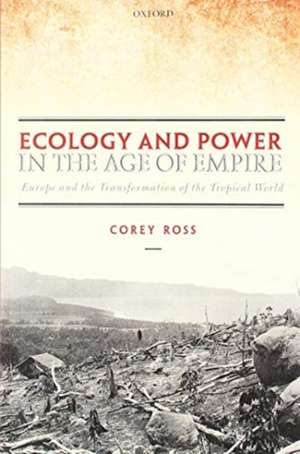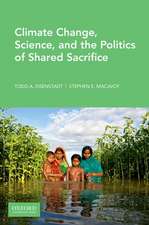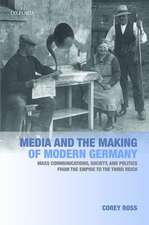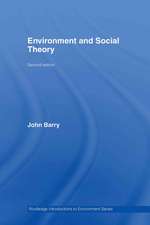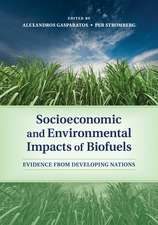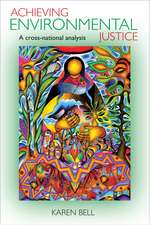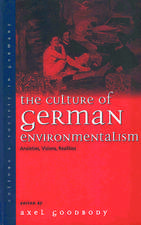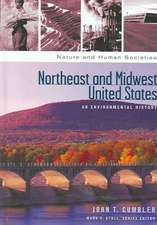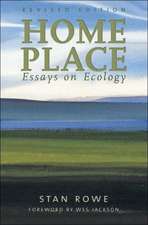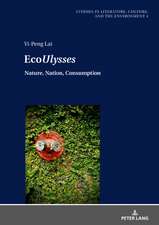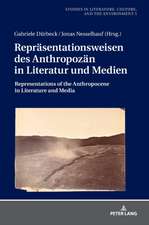Ecology and Power in the Age of Empire: Europe and the Transformation of the Tropical World
Autor Corey Rossen Limba Engleză Paperback – 24 ian 2019
| Toate formatele și edițiile | Preț | Express |
|---|---|---|
| Paperback (1) | 201.69 lei 10-16 zile | |
| OUP OXFORD – 24 ian 2019 | 201.69 lei 10-16 zile | |
| Hardback (1) | 516.48 lei 31-37 zile | |
| OUP OXFORD – 5 apr 2017 | 516.48 lei 31-37 zile |
Preț: 201.69 lei
Preț vechi: 240.47 lei
-16% Nou
Puncte Express: 303
Preț estimativ în valută:
38.60€ • 41.91$ • 32.42£
38.60€ • 41.91$ • 32.42£
Carte disponibilă
Livrare economică 21-27 martie
Preluare comenzi: 021 569.72.76
Specificații
ISBN-13: 9780198841883
ISBN-10: 0198841884
Pagini: 496
Ilustrații: 21 black and white figures/illustrations
Dimensiuni: 166 x 238 x 26 mm
Greutate: 0.7 kg
Editura: OUP OXFORD
Colecția OUP Oxford
Locul publicării:Oxford, United Kingdom
ISBN-10: 0198841884
Pagini: 496
Ilustrații: 21 black and white figures/illustrations
Dimensiuni: 166 x 238 x 26 mm
Greutate: 0.7 kg
Editura: OUP OXFORD
Colecția OUP Oxford
Locul publicării:Oxford, United Kingdom
Recenzii
An impressive tour de force of colonial environmental history ... A really impressive book on how ecological resources were claimed, used and spoiled by colonial agents, from individuals to states.
...imperial historians will find the environmental framework, especially when so broadly applied, a valuable way to interpret the impact of Europe's various empires on the modern world. Ross exposes similarities and highlights differences between differing imperial approaches and those of the indigenous populations, allowing for an incredibly nuanced presentation of shared ideas and practices applied to commodities across empires, concluding with their legacies. Environmental historians too will find much of interest in Ross's approach to explaining how the latter stages of empire helped influence future environmental development policy and thinking.
Ross is a fine writer who lays out his analyses in lucid narratives
brilliant
Ross's Ecology and Power in the Age of Empire is a genuine tour de force that will surely be a landmark book in both environmental history and imperial history. It takes a synthetic, multi-empire approach in the period since the 1860s, surveying the ecological contexts and consequences of colonial economies as well as growing imperial interest in resource conservation. Ross focuses on the tropical regions of Asia and Africa, taking the reader from the tin mines of Malaya to the cocoa plantations of West Africa with many stops in between. Ross's prose is agreeable and his arguments clear. His research in the specialist literature and published primary sources in English, French, Dutch, and German is thorough. Altogether a superb achievement and a great service to historians and other lovers of history.
it is easy to envision Ecology and Power in the Age of Empire fitting comfortably into a range of teaching scenarios, from advanced undergraduate courses to graduate seminars on environmental history, world history, and empire ... It is a tremendous pleasure to review a masterwork. Its author should be heartily commended for producing such a wide-ranging, readable, and engaging book. I look forward to assigning Ecology and Power in the Age of Empire to many current and future students.
In this work, students will find an excellent bibliography of 1,106 entries, 1,544 footnotes, and superb reviews of the history of cotton, chocolate (cocoa), rubber, tin, copper, and oil. The book is highly readable with insights throughout for social scientists, conservation biologists, agronomists, and ecologists ... Recommended.
...imperial historians will find the environmental framework, especially when so broadly applied, a valuable way to interpret the impact of Europe's various empires on the modern world. Ross exposes similarities and highlights differences between differing imperial approaches and those of the indigenous populations, allowing for an incredibly nuanced presentation of shared ideas and practices applied to commodities across empires, concluding with their legacies. Environmental historians too will find much of interest in Ross's approach to explaining how the latter stages of empire helped influence future environmental development policy and thinking.
Ross is a fine writer who lays out his analyses in lucid narratives
brilliant
Ross's Ecology and Power in the Age of Empire is a genuine tour de force that will surely be a landmark book in both environmental history and imperial history. It takes a synthetic, multi-empire approach in the period since the 1860s, surveying the ecological contexts and consequences of colonial economies as well as growing imperial interest in resource conservation. Ross focuses on the tropical regions of Asia and Africa, taking the reader from the tin mines of Malaya to the cocoa plantations of West Africa with many stops in between. Ross's prose is agreeable and his arguments clear. His research in the specialist literature and published primary sources in English, French, Dutch, and German is thorough. Altogether a superb achievement and a great service to historians and other lovers of history.
it is easy to envision Ecology and Power in the Age of Empire fitting comfortably into a range of teaching scenarios, from advanced undergraduate courses to graduate seminars on environmental history, world history, and empire ... It is a tremendous pleasure to review a masterwork. Its author should be heartily commended for producing such a wide-ranging, readable, and engaging book. I look forward to assigning Ecology and Power in the Age of Empire to many current and future students.
In this work, students will find an excellent bibliography of 1,106 entries, 1,544 footnotes, and superb reviews of the history of cotton, chocolate (cocoa), rubber, tin, copper, and oil. The book is highly readable with insights throughout for social scientists, conservation biologists, agronomists, and ecologists ... Recommended.
Notă biografică
Corey Ross is Professor of Modern History at the University of Birmingham and the author of several books on the history of mass media and popular culture, heritage and ancestral pasts, and everyday life under state socialism, with a particular focus on Germany. Since arriving at Birmingham in 1998, he has held an Alexander von Humboldt Fellowship at the Freie Universität Berlin, a J. Walter Thompson Fellowship at Duke University, a guest professorship at the Université Paris-II, a National Endowment for the Humanities Fellowship, and a Leverhulme Major Research Fellowship. His primary research interests are in global environmental history, modern imperialism, and modern European social and cultural history.
